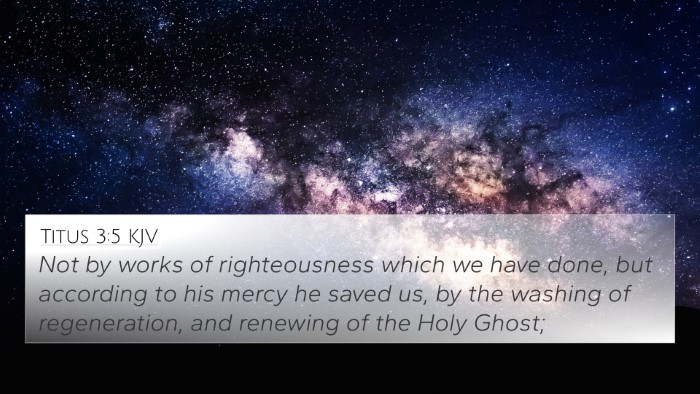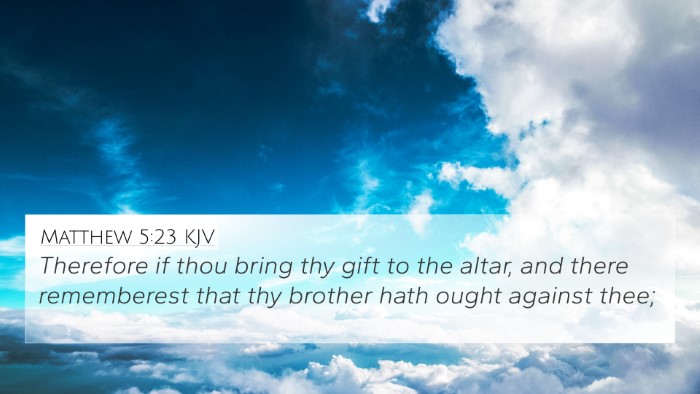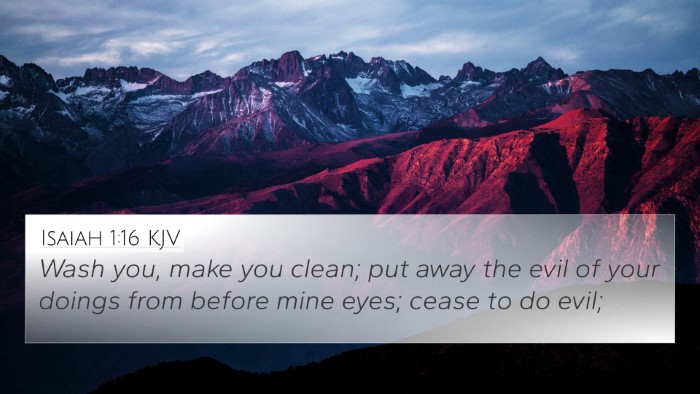Psalms 26:6 - Commentary and Meaning
Psalms 26:6 states: "I will wash my hands in innocence: so will I compass thine altar, O Lord:" This verse reflects the psalmist's commitment to purity and devotion. In this analysis, we explore the underlying themes and connections this verse has within the broader context of Scripture.
Understanding Psalms 26:6
This verse represents a vivid expression of the psalmist's desire for God's presence through acts of ceremonial purity. By washing his hands, the psalmist signifies an internal state of righteousness before approaching the altar of the Lord.
Insights from Commentaries
- Matthew Henry: He emphasizes the importance of inward purity as a prerequisite for outward worship. The washing of the hands symbolizes an acknowledgment of moral integrity and a sincere heart in approaching God.
- Albert Barnes: Barnes interprets the act of washing hands as expressing the need for personal purity when participating in worship. He notes that the altar signifies a place of sacrifice, indicating the psalmist's desire to come before God with a clean heart.
- Adam Clarke: Clarke elaborates on the function of the altar in ancient worship. He asserts that the psalmist is not only preparing himself but is also making a statement of faith, as the act of cleanliness reflects the sacredness of the worship space.
Thematic Connections
Psalms 26:6 is interwoven with themes found throughout both the Old and New Testaments that address purity, sacrifice, and worship. Here are some verses providing connections:
- Hebrews 10:22: "Let us draw near with a true heart in full assurance of faith, having our hearts sprinkled from an evil conscience and our bodies washed with pure water." This verse highlights the New Testament understanding of entering God's presence with purity.
- Matthew 5:8: "Blessed are the pure in heart: for they shall see God." Both passages emphasize the necessity of purity as a condition for divine encounter.
- Psalms 51:7: "Purge me with hyssop, and I shall be clean: wash me, and I shall be whiter than snow." The motif of washing reflects a desire for spiritual cleansing.
- Exodus 30:17-21: Instructions on washing before entering the sanctuary demonstrate the significance of physical cleansing as a precursor to spiritual communion with God.
- 1 John 1:9: "If we confess our sins, he is faithful and just to forgive us our sins, and to cleanse us from all unrighteousness." This correlation further establishes the notion of the need for cleansing before worship.
- James 4:8: "Draw nigh to God, and he will draw nigh to you. Cleanse your hands, ye sinners; and purify your hearts, ye double minded." This reflects the transformative approach toward God that parallels the psalmist's actions.
- Psalms 24:3-4: "Who shall ascend into the hill of the Lord? or who shall stand in his holy place? He that hath clean hands, and a pure heart..." Here, we see a direct relationship to the requirements for standing before God.
Cross-Referencing Psalms 26:6
The act of washing hands before the altar can be understood through a broader framework of Biblical texts that discuss worship, reverence, and purity. Tools for Bible cross-referencing can illuminate these connections:
- Bible Concordance: Utilize a concordance to identify themes related to purity and worship.
- Bible Cross-Reference Guide: Such guides help trace thematic paths through various scriptures.
- Bible Chain References: Following chain references can help track related verses across the Bible.
Comparative Bible Verse Analysis
This verse reflects rich connections with other biblical themes, fostering a deeper understanding of what it means to be purified and prepared for the presence of God. Its significance extends beyond mere ritual acts to embrace a lifestyle that resonates with the heart of God.
By studying Psalms 26:6 and its related verses, believers can deepen their understanding of how one approaches God—acknowledging the necessity of purity and sincerity in worship.
Conclusion
Psalms 26:6 stands as a compelling invitation to examine our spiritual posture as we enter into worship. Through the lens of cross-references and thematic connections, the act of washing hands becomes not merely a ritual but a profound statement of heart and faith, calling us towards a life that honors God and aligns with His holiness.













